|
|
|
Sort Order |
|
|
|
Items / Page
|
|
|
|
|
|
|
| Srl | Item |
| 1 |
ID:
141229
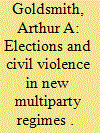

|
|
|
|
|
| Summary/Abstract |
The introduction of multiparty competition around the world following the Cold War raises the specter of rising civil violence during election periods in emerging democracies and hybrid regimes. Yet there are also plausible theoretical reasons to expect dropping civil violence around elections in these states or, alternatively, no significant change in the level of such conflict. This article tests these hypotheses in Africa with the aid of event data on the daily rate of civil violence incidents (1997–2013). It asks if civil violence in that region is more frequent, less frequent or constant during election cycles compared to other times. To guard against definitional and data selection problems encountered in some prior cross-national studies of elections and use of force, the research design emphasizes the relative risk of social conflict at the national level. The analysis suggests three distinct patterns in Africa. Given countrywide norms, election periods in most countries run the same relative risk of a day with violent events as do non-election periods. A subset of African countries exists, however, with more civil violence during elections when judged against the national reference line for conflict. There is a smaller group of countries where the risk of electoral civil violence is comparatively low. While caution should be exercised in interpreting the findings, the policy implication is that no general reason exists to preclude or defer elections in Africa as a way to minimize social conflict associated with political campaigns, although there may be specific reasons to do so in particular countries.
|
|
|
|
|
|
|
|
|
|
|
|
|
|
|
|
| 2 |
ID:
159359
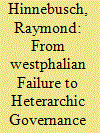

|
|
|
|
|
| Summary/Abstract |
The problematic export of the Westphalian system to MENA is examined, taking Syria as exemplar. The export model is juxtaposed to actual non-lineal trajectories, semi-sovereignty and hybrid or failing states. This is manifested in post-uprising Syria in failing statehood, fragmented and overlapping governance, permeable and collapsing borders, the loss of sovereignty to trans-state movements, “competitive regime-building” between the Asad regime and jihadist warlords, and “competitive interventionism” by external powers filling the governance vacuum with their own proxies. The result is heterarchic zones of limited statehood in which state sovereignty is contested by both international (supra-state) penetration and sub-state fragmentation.
|
|
|
|
|
|
|
|
|
|
|
|
|
|
|
|
| 3 |
ID:
085752
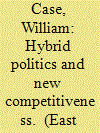

|
|
|
|
|
| Publication |
2008.
|
| Summary/Abstract |
In recounting Hong Kong's chief executive election in 2007, this paper charts the unexpected appearance of an "unauthorized" candidate and the occurrence of vibrant campaigning. Further, as electoral competitiveness increased, the liberal form of authoritarian rule that has characterized politics in the Hong Kong Special Administrative Region (HKSAR) began to change in ways that parallel the electoral authoritarianism practiced in Singapore. This paper argues that such change, if regularized and enhanced, may bring greater stability to the HKSAR's politics, yielding greater legitimacy, popular compliance, and hence, new efficiencies in control. Even so, analysis of the chief executive election shows that this competitiveness was strongly resisted by the central government in Beijing.
|
|
|
|
|
|
|
|
|
|
|
|
|
|
|
|
| 4 |
ID:
156834
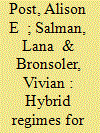

|
|
|
|
|
| Summary/Abstract |
There is a growing recognition that the state is not the sole provider of “local public goods” such as water and education in the developing world. Mainstream approaches to the study of local public goods provision, however, have yet to incorporate these insights. We offer a descriptive typology of hybrid local public goods regimes, or systems in which both state and non-state actors contribute to provision. It emphasizes two dimensions: the type of state involvement (direct versus indirect provision), and the degree of formal state penetration. The politics of producing local public goods, we argue, takes on distinct forms in each cell. The framework allows scholars to develop more accurate and precise explanations of variation in service quality and access, and to choose more appropriate outcome measures. We illustrate the utility of this framework by analyzing distinct hybrid regimes for water and sanitation, and mass transit in Africa, Asia, and Latin America.
|
|
|
|
|
|
|
|
|
|
|
|
|
|
|
|
| 5 |
ID:
179208
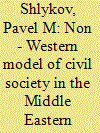

|
|
|
|
|
| Summary/Abstract |
The article analyzes the specific experience of civil society development in the Middle East, which remarkably exposes the dilemma underlying the civil society concept as a matrix of working democracy. This concept limits the understanding of the very phenomenon of civil society and peculiarities of its functioning in the region. An analysis of the Middle Eastern specifics requires a functional approach and a hybrid definition of civil society. This approach has a number of heuristic advantages over both liberal and critical theories. The article outlines the Middle Eastern model of civil society and postulates the key characteristic of illiberal civil society—it becomes conducive to the reproduction of authoritarian regimes even despite its institutional diversity. The analysis shows the ambivalence of civil society in the Middle East as a space of limited freedom of political/non-political activity and as a testing ground for the development of various tools designed to curb civic initiative. The liberal model of civil society, directly incorporated in state-building, is turned upside down in the Middle East. Civil society organizations in this region are hardly functional as an outpost for promoting liberal democratic values because they prove to serve the interests of the elite or alternative political forces much more than the interests of ordinary citizens.
|
|
|
|
|
|
|
|
|
|
|
|
|
|
|
|
| 6 |
ID:
160425
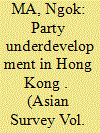

|
|
|
|
|
| Summary/Abstract |
Twenty years after 1997, political parties in Hong Kong are still underdeveloped. The hybrid regime has posed major constraints, as there are no governing parties, and democratic development is slow. The parties have also found it difficult to respond to value changes toward radicalization, a new political identity, and post-materialism, with support shifting to new movement groups.
|
|
|
|
|
|
|
|
|
|
|
|
|
|
|
|
| 7 |
ID:
184164
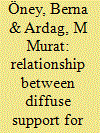

|
|
|
|
|
| Summary/Abstract |
Political culture is congruent with the regime’s form in stable democracies as well as autocracies. In contrast, hybrid regimes are unstable by nature, and the relationship between political culture and regime legitimacy remains ambiguous. How does diffuse support for democracy influence the vote for the governing party in a hybrid regime? By employing the Turkish case as an example and using four nationally representative samples, we discover that being an active citizen and participating in civic political engagement decrease the probability of voting for the governing party. Preferring a strong leader and a stable government over a democratic one and feeling satisfied with the current level of democracy have the opposite effect. Previous literature suggested the lack of a democratic political culture in Turkey. In contrast to these findings, the results show traces of civic culture and the presence of democratic notions.
|
|
|
|
|
|
|
|
|
|
|
|
|
|
|
|
| 8 |
ID:
124051
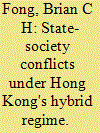

|
|
|
|
|
| Publication |
2013.
|
| Summary/Abstract |
Similar to its colonial predecessor, the post-colonial Hong Kong state relies on its business allies to mediate state-society relations. Nevertheless, because of the erosion of the intermediary role of business elites, the state-business alliance now struggles to accommodate the rising challenges of civil society. The case of Hong Kong offers an interesting case study to the literature on hybrid regimes.
|
|
|
|
|
|
|
|
|
|
|
|
|
|
|
|
| 9 |
ID:
179120
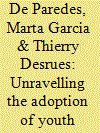

|
|
|
|
|
| Summary/Abstract |
Parliamentary youth quotas have been adopted by nine countries, mainly African autocracies. They have also attracted the attention of international organisations, which consider them indicators of democratic progress. Why were these quotas adopted? This article challenges the long-standing regime survival thesis by explaining quota adoption as the result of the convergent strategies of actors placed inside and outside the regime. It also provides new theoretical arguments that point to the transformation of representative linkages in hybrid regimes and shows how this is justified in the light of empirical evidence grounded on qualitative methodology and extensive fieldwork. By connecting the broader historical and socio-political context where youth quotas emerged – Africa – to the micro-level processes of quota adoption – based on the Moroccan case – this article provides a dynamic picture of how political representation is claimed and mobilised in contemporary Africa while shedding some light on the inclusive limits of quota policies.
|
|
|
|
|
|
|
|
|
|
|
|
|
|
|
|
|
|
|
|
|